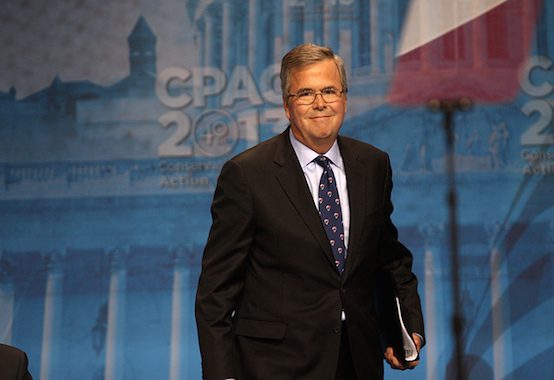Get Ready for Jeb Bush

Michael Dukakis ran against George H.W. Bush in 1988, making the case that the election should be about competence, not ideology. Dukakis lost. George W. Bush a dozen years later became one of his father’s successors, presiding over an administration known much more for ideology.
Would a more competent proponent of George W. Bush’s agenda have been a better president? Former Florida Gov. Jeb Bush may seek to provide an answer to that question. Republican establishment bigwigs are apparently coming around to the idea of a third Bush presidency.
“Concerned that the George Washington Bridge traffic scandal has damaged New Jersey Gov. Chris Christie’s political standing and alarmed by the steady rise of Sen. Rand Paul (Ky.),” the Washington Post reports, “prominent donors, conservative leaders and longtime operatives say they consider Bush the GOP’s brightest hope to win back the White House.”
Elephants never forget, the cliché goes, but these Republican pachyderms have very short memories. Our last President Bush left office with a 34 percent approval rating, according to Gallup. On the eve of the 2008 election, in which the Republicans were routed, 70 percent disapproved of Bush’s performance in office while 25 percent approved.
As Dubya cratered, Republicans lost control of both houses of Congress. Democrats nearly won a filibuster-proof Senate majority in 2008—which they ultimately secured with Arlen Specter’s defection—just four years after the GOP took a 55-45 majority.
The senior George Bush didn’t leave his party in much better shape. His share of the popular vote tumbled 16 points from 1988 to 1992, ending up with the worst showing of any Republican nominee since Alf Landon in 1936 and of any incumbent president since William Howard Taft in 1912.
Comes the rejoinder: as bad as things looked for Bush 41 in ’92, Republicans won majorities in both houses of Congress—their first time controlling the House in 40 years—just two years later. By 1999, Republicans were ready to nominate another Bush for president. The polls suggested the country as a whole was ready to elect him.
Notwithstanding how close and contentious the 2000 election results turned out to be, that’s all basically true.
Imagining a Jeb Bush presidency has actually been a political parlor game for quite some time. If Jeb had won his first campaign for governor in 1994, he likely would have been the 2000 Republican presidential nominee. Instead he lost to Lawton Chiles while his brother George beat Anne Richards in Texas.
During the run-up to the 2000 Republican primaries, Jeb—who finally did win the Florida governorship in 1998—hadn’t served long enough to be a credible presidential nominee. His brother was then in his second term as governor of Texas. The rest was history.
Republicans have always had reason to regret this twist of fate. Jeb likely would have won Florida cleanly and convincingly, without the hanging chads or Bush v. Gore Supreme Court decision. He might have won the popular vote too.
But Jeb’s reputation as a policy wonk, far more engaged than his brother in the details of governing, has also led many to wonder what might have been. Even the columnist Joseph Sobran, writing late in life when he was far removed from Republican circles, mused, “Jeb might have been an intelligent and tolerable president.”
Some even hope Jeb will be more like his father and less like his brother. Bush 41 richly deserved that 1992 primary challenge, but he was more prudent on foreign policy than many Republicans who have come after. And Dukakis was ultimately wrong about him: George Bush was competent and, for both good and ill, not terribly ideological.
Alas, Jeb is giving little reason to think a third Bush presidency would mark the reemergence of a Brent Scowcroft-style realism. He has been recycling the usual hawkish lines about President Obama encouraging “American passivity” and Paul promoting “neo-isolationism.”
“He showed a lot of knowledge about foreign policy that he must have been working hard to acquire,” said Ari Fleischer, the former Bush 43 press secretary whose boss’s “knowledge about foreign policy” gave us the Iraq War. The setting was an event hosted by casino billionaire Sheldon Adelson, who has suggested dropping an atomic bomb on Iran.
So far there is little serious indication that Jeb Bush is getting ready to run for president, but he doesn’t have to start yet. He could mobilize the fundraising and campaign infrastructure quickly—the Post quotes a Republican bundler as saying “the ‘vast majority’ of Romney’s top 100 donors would back Bush in a competitive nomination fight.”
Competitive it may well be. If—and this is a big if—conservatives don’t hopelessly split their votes between several semi-serious candidates, they may be facing the party establishment on the closest thing to even terms since Reagan. If Bush and Christie both run, it may be the establishment that is split. A Bush candidacy would likely prevent Marco Rubio from running; it would also make things harder for Paul Ryan.
Do the American people even want another Bush vs. Clinton presidential contest, turning the 2016 campaign into the latest front of a tired dynastic war? And this month, George P. Bush—Jeb’s son—won the Republican nomination for Texas land commissioner.
W. James Antle III is editor of the Daily Caller News Foundation and author of Devouring Freedom: Can Big Government Ever Be Stopped?
Comments